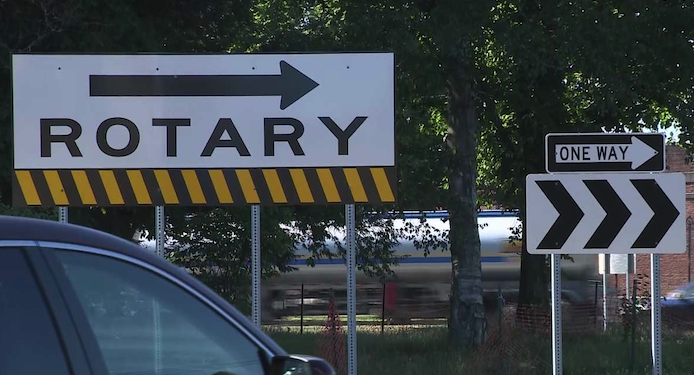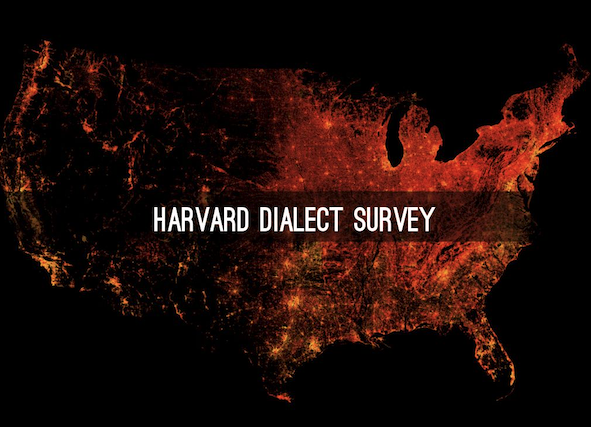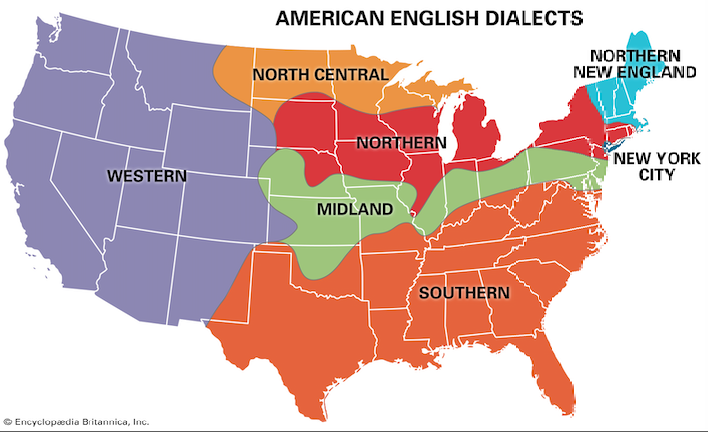UNITED WE SPEAK... AMERICAN
On a typical Sa'day mornin', some Bubba from Biloxi roars down the expressway a piece, a fur piece. He dodges eighteen-wheelers, wheels onto a service road, handles a roundabout. He stops for a Po' Boy and a Cocola, then goes to a yard sale. He gets hisself a skillet.
On the same Saturday, some dude from LA zips down the freeway a ways. He dodges semis, cruises onto a frontage road and around a traffic circle. He stops for a sandwich and a soft drink, then hits up a garage sale. He scores a frying pan.
Meanwhile, some Barney from Boston barrels down the highway a few miles. He dodges tractor trailers, hangs a louie onto a service road and negotiates the rotary. He stops for a grinder and a soda, then goes to a tag sale. He coughs up for some sneakers, which in LA and Birmingham are called... tennis shoes.
Time was when you said To-MAY-to, I said To-MAH-to and we called the whole thing off. Then in 2003, the Harvard Dialect Survey showed how deeply divided Americans are. Politics? Sure, red and blue states. But Harvard's study of American speech revealed more than 100 terms we simply can't agree on.
Philadelphia has trolleys. New Orleans has streetcars (one named Desire.) San Francisco has (ahem!) light rail. The Midwest has fireflies but the South has lightning bugs. Seattle calls a bunch of people "you guys." New Jersey calls them "youse" or "youse guys." In Alabama, it's y'all or even "all y'all."
Americans can't even agree on where to throw their trash. In the trash can (roughly everywhere south of Interstate 80)? Or in the garbage can (everywhere else)?
So specific, so regional is our speech that linguists can pinpoint where you grew up by how you say just 25 terms. When I took the survey, my use of freeway, soft drink, garage sale, etc. hog-tied me to two regions -- California and Illinois. I was raised in California by a mother from Illinois.
Back in the Twenties, journalist H.L. Mencken took a reverent look at American speech, finding it inventive and delightful. "America thus shows its character in a constant experimentation, a wide hospitality to novelty, a steady reaching out for new and vivid forms." Mencken's 800-page tome lists thousands of "Americanisms," from absquatulate to zowie. Many are now "history," or course, but Mencken celebrated the unique American talent for talk.
"Such a term as rubber-neck," he wrote, "is almost a complete treatise on American psychology. . . It has in it precisely the boldness and contempt for ordered forms that are so characteristically American, and it has, too, the grotesque humor of the country, the delight in devastating opprobriums, and the acute feeling for the succinct and savory."
But there was trouble a-brewin'. (A fly in the ointment. A bummer. A snafu.) First radio, then TV threatened to homogenize American speech. Linguists worried that once TV did the talking, we would all wake up one day sounding like some humdrum, stick-in-the-mud emcee (think Pat Sajak, Alex Trebek, or that ONE English teacher you had). But it weren't necessarily so.
Instead, local color is still cherished, and our day-to-day patois is spiced by phrases everyone finds cool or just useful. LOL. OMG. Jonesing. 24/7.
Speech, it seems, is more than just communication. Speech is culture, community, camaraderie. As one linguist explained, "People want to talk like the people they want to be like." And in America, the people we want to be like aren't on TV. They're on their way over for a beer, a brew, a brewski, a cerveza, a cold one...
So you say youse, I say you guys. You say trash can, I say garbage can. You say access road, I say frontage road -- or in Houston a "feeder road." And along with H.L. Mencken, I say we celebrate how "the American, on his linguistic side, likes to make his language as he goes along. And not all the hard work of his grammar teachers can hold the business back."
'Nuff said. 10/4 good buddy. I'm outta here.










